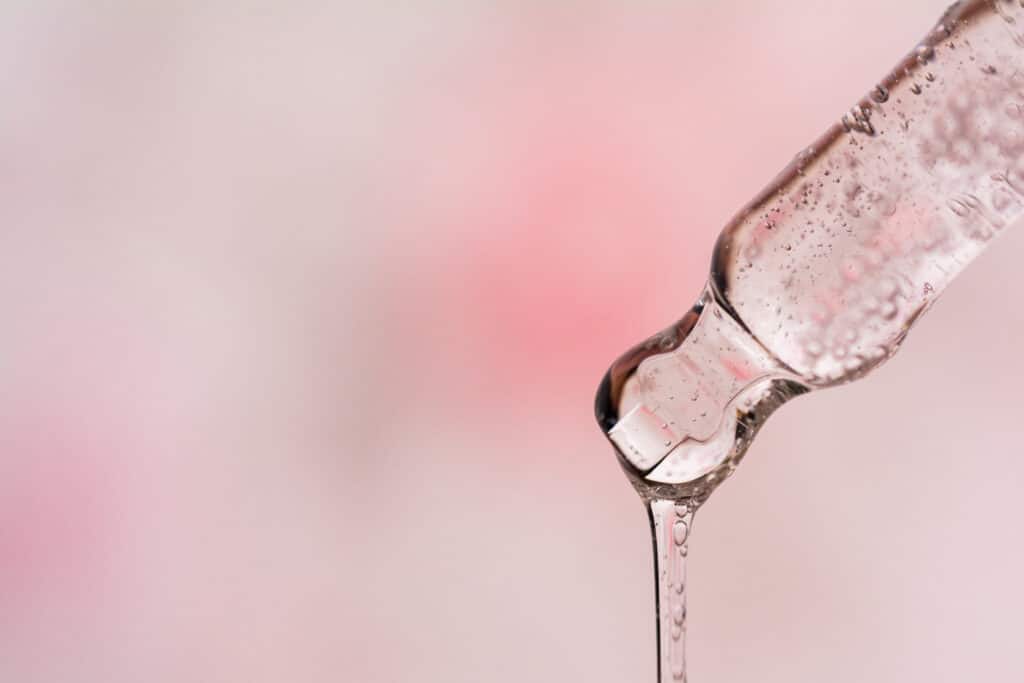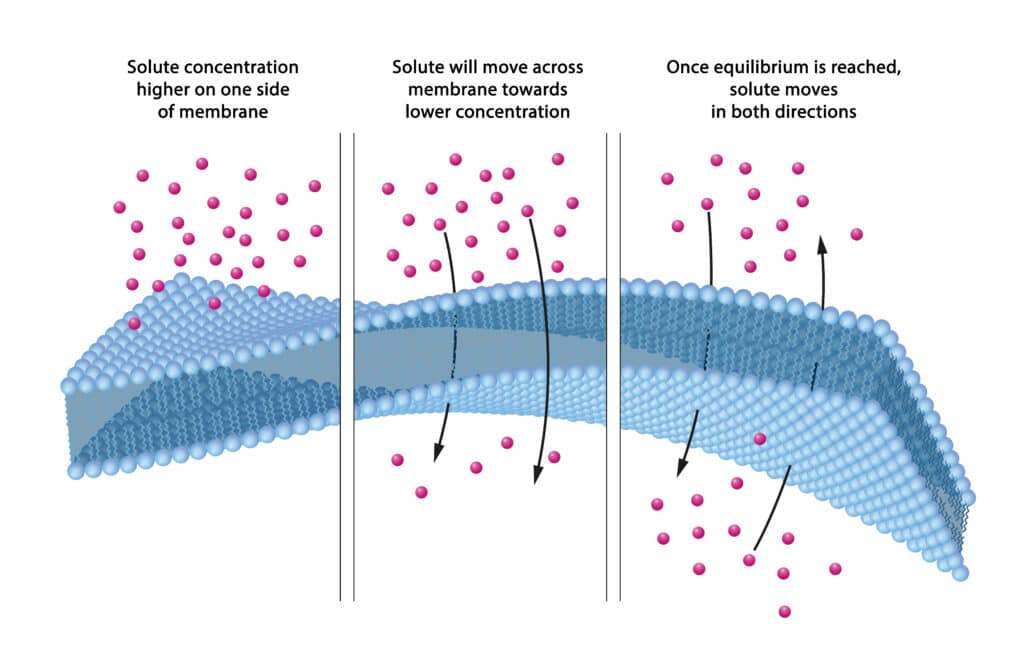written by: Allison Goins, Ph.D. | Update on October 5th, 2024 at 7:2 am | Published on May 10th, 2021 at 6:05 pm
I’ve noticed an increasing number of discussions lately regarding hyaluronic acid’s potential to cause dehydrated skin. Which has created a lot of discussion about when to apply hyaluronic acid. In this post, we’ll address the question: Is hyaluronic acid good for dry skin or a dry climate? To do that, let’s delve into the science behind hyaluronic acid and determine whether its reputation as a hydration powerhouse and sometimes dehydrating agent holds true or if it’s just a misconception.

If you’re someone who keeps up with skincare news, you might have come across claims that misusing hyaluronic acid can actually lead to dehydration. This has led some to believe that other molecules, like polyglutamic acid, might be better for your skin. While there’s some validity to this argument, it’s essential to understand the whole picture. Today, we’ll explore when to apply hyaluronic acid and whether hyaluronic acid can dehydrate the skin.
Related Post: Polyglutamic Acid Serum: Is it a Must-Have in Your Routine?
What is Hyaluronic Acid? | How Does It Work In Your Routine? | Is It Good For Dry Skin? | When To Apply It
What is Hyaluronic Acid?
Hyaluronic acid is a natural biopolymer commonly used in dermal fillers and skincare products for its hydrating properties. Your skin produces this polymer naturally. More specifically, hyaluronic acid belongs to a category of polymers known as polysaccharides. These are large sugar molecules. They are trendy in skincare because of their remarkable ability to retain water, often many times their weight.
Related Post: Hyaluronic Acid Fillers, What You Need to Know
In skincare, this category of molecules is typically referred to as a humectant. This unique quality earns hyaluronic acid its reputation as the “ultimate hydrator” in skincare, as it can serve as a long-term reservoir for skin hydration.
How Does Hyaluronic Acid Work in Skincare?
In skincare, hyaluronic acid is often referred to as a humectant. Humectants are molecules that can attract water and hold onto water. This is helpful in skincare because excess water from actives can help keep your skin hydrated throughout the day. Hydration is important because when your skin is dry or dehydrated, it can form superficial lines and wrinkles. If your skin is chronically dehydrated, those lines and wrinkles can become semi-permanent.
Related Post: Lines, Wrinkles, & What?: Unveiling the Signs of Aging Skin
Hyaluronic acid can help combat this by providing excess moisture for your skin. Your skin consists of three layers: the epidermis, the dermis, and the subcutaneous layer. The epidermis acts as a protective barrier, preventing the penetration of large molecules. Hyaluronic acid can deliver moisture to multiple layers of your skin however it depends on the size of the hyaluronic acid molecule.
Related Post: The Types of Hyaluronic Acid: Is Sodium Hyaluronate Different than Hyaluronic Acid?
If hyaluronic acid molecules are too large, they will remain on the skin’s surface and act as surface hydrators. However, when smaller hyaluronic acid molecules are applied, they can penetrate the epidermis and reach the dermis, bringing water to where skin cells and blood vessels reside.
This differentiates hyaluronic acid from most other molecules and makes it stand out as an effective skincare ingredient when used correctly. Many other skincare ingredients fail to penetrate the epidermis, limiting their ability to deliver the promised benefits, as some of those benefits only manifest when they interact with skin cells in the dermis. The exception to this would be glycerin, which is another small humectant that can penetrate your skin’s barrier.
Related Post: Using Glycerin for Skin: Glycerin vs. Hyaluronic Acid
Is Hyaluronic Acid Good For Dry Skin?
Now, let’s tackle the claim that hyaluronic acid can be dehydrating or harmful to dry skin. This claim is based on the fact that hyaluronic acid has a strong affinity for water. As a humectant, hyaluronic acid can attract and retain moisture from its surroundings. This has led some to believe that, as a skincare ingredient, it can not only hold onto the excess moisture from your skincare but also draw moisture away from the deeper layers of the skin, resulting in a tight, dehydrated feeling or appearance.
However, this is not accurate. If your skin becomes irritated or dry when using hyaluronic acid, there are two possibilities. One reason could be your skin isn’t responding positively to hyaluronic acid, or there isn’t sufficient moisture available when applying hyaluronic acid, rendering its humectant properties ineffective. The second reason was recently hypothesized by a popular cosmetic chemist, Kind of Stephen.
He hypothesized the tightness could come from the hyaluronic acid being a polymer acting as a film former. Film formers in skincare dry down and can have a tightening effect on your skin. This can be desirable in products that target under-eye bags (see the viral Peter Thomas Roth under-eye cream). However, if you are not expecting it, it could make you believe your skin is dehydrated due to the tight feeling.
But specifically, the biological reason hyaluronic acid is not dehydrating your skin can be explained by a biological phenomenon called homeostasis.
Understanding Homeostasis and Its Relation to Hyaluronic Acid

Homeostasis is the body’s innate ability to maintain a stable equilibrium among interdependent elements. You might wonder how this concept relates to hyaluronic acid. Allow me to clarify.
Your body excels at balancing the concentrations of essential molecules like water and nutrients that cells and organs require to function optimally. In particular, diffusion is a dynamic process in which molecules (in our case, water) move through a semipermeable membrane (such as hyaluronic acid) from areas of high concentration (still the hyaluronic acid) to areas of low concentration (your skin). This constant process ensures that equilibrium is maintained. So, the hyaluronic acid you apply will never dehydrate your skin because there will be a balance.
The one exception is if you have a damaged skin barrier. When your skin barrier is damaged, you can experience excess water loss.
Related Post: Demystifying Your Skin Barrier: What Is It and How Does It Get Damaged
But that doesn’t mean there aren’t things you can do to maximize the benefits of hyaluronic acid.
Final Answer: When to Apply Hyaluronic Acid?
So, to address the question of when to apply hyaluronic acid. You can use hyaluronic acid regardless of the environment you live in, and it can be applied in the morning or evening. When nothing else is going on with your skin, hyaluronic acid won’t dehydrate it. If your skin feels tight, it could be the film-forming effect of larger hyaluronic acid molecules or an adverse reaction.
In conditions with ample moisture in the air and your skin, hyaluronic acid can act as an adequate moisture reservoir. However, it won’t perform miracles by overly hydrating your skin because your environment is humid, and your skin naturally pulls moisture out of the air. When moisture is scarce in the environment, and your skin is already dehydrated, hyaluronic acid won’t worsen the situation.
Instead, it will work to evenly distribute the available moisture within your skin, thanks to the principles of homeostasis. However, it will not plump your skin or temporarily get rid of fine lines and wrinkles because there is no excess water available. To combat this, you can periodically refresh your skin with water or a hydrating serum like Mario Badescue’s Facial Spray to make sure you are constantly giving your skin moisture throughout the day.
Remember, proper use and understanding how your skin reacts to it is the key to getting the most out of hyaluronic acid. So, feel confident in incorporating hyaluronic acid into your skincare routine if it suits your needs and your skin’s preferences.
